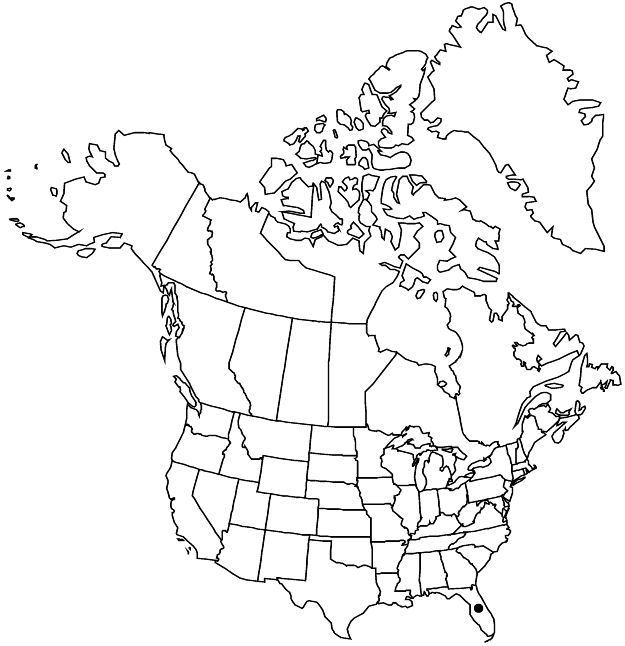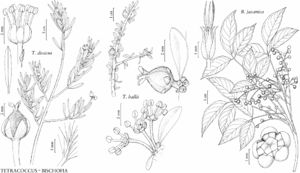Difference between revisions of "Bischofia javanica"
Bijdr. Fl. Ned. Ind. 17: 1168. 1827.
FNA>Volume Importer |
imported>Volume Importer |
||
| (6 intermediate revisions by 2 users not shown) | |||
| Line 12: | Line 12: | ||
}}{{Treatment/ID/Special_status | }}{{Treatment/ID/Special_status | ||
|code=F | |code=F | ||
| − | |label= | + | |label=Illustrated |
}} | }} | ||
|basionyms= | |basionyms= | ||
| Line 30: | Line 30: | ||
|elevation=0–50 m. | |elevation=0–50 m. | ||
|distribution=Fla.;s;e Asia;Pacific Islands;Australia;introduced also in s;e Africa. | |distribution=Fla.;s;e Asia;Pacific Islands;Australia;introduced also in s;e Africa. | ||
| − | |discussion=<p>Bischofia javanica is invasive from southern Florida to Pinellas County; it is cultivated sporadically north to Alachua County.</p><!-- | + | |introduced=true |
| − | --><p>Once promoted as a fast-growing ornamental and street tree, Bischofia javanica frequently colonizes cultivated ground, sprouting among shrubs and hedges; it also invades natural areas. In addition to its potential to displace native vegetation in Florida, B. javanica serves as host to a variety of destructive leaf spot diseases and insect pests, especially scales (J. F. Morton 1984). Pouchlike domatia inhabited by mites can sometimes be found in the angles of major veins on abaxial leaf surfaces (S. A. Rozario 1995). Bischofia javanica is also cultivated in southern California, where it has shown no invasive tendencies.</p> | + | |discussion=<p><i>Bischofia javanica</i> is invasive from southern Florida to Pinellas County; it is cultivated sporadically north to Alachua County.</p><!-- |
| + | --><p>Once promoted as a fast-growing ornamental and street tree, <i>Bischofia javanica</i> frequently colonizes cultivated ground, sprouting among shrubs and hedges; it also invades natural areas. In addition to its potential to displace native vegetation in Florida, <i>B. javanica</i> serves as host to a variety of destructive leaf spot diseases and insect pests, especially scales (J. F. Morton 1984). Pouchlike domatia inhabited by mites can sometimes be found in the angles of major veins on abaxial leaf surfaces (S. A. Rozario 1995). <i>Bischofia javanica</i> is also cultivated in southern California, where it has shown no invasive tendencies.</p> | ||
|tables= | |tables= | ||
|references= | |references= | ||
| Line 40: | Line 41: | ||
-->{{#Taxon: | -->{{#Taxon: | ||
name=Bischofia javanica | name=Bischofia javanica | ||
| − | |||
|authority=Blume | |authority=Blume | ||
|rank=species | |rank=species | ||
| Line 55: | Line 55: | ||
|publication title=Bijdr. Fl. Ned. Ind. | |publication title=Bijdr. Fl. Ned. Ind. | ||
|publication year=1827 | |publication year=1827 | ||
| − | |special status=Introduced; | + | |special status=Introduced;Illustrated |
| − | |source xml=https:// | + | |source xml=https://bitbucket.org/aafc-mbb/fna-data-curation/src/2e0870ddd59836b60bcf96646a41e87ea5a5943a/coarse_grained_fna_xml/V12/V12_415.xml |
|genus=Bischofia | |genus=Bischofia | ||
|species=Bischofia javanica | |species=Bischofia javanica | ||
Latest revision as of 20:15, 5 November 2020
Trees, to 15[–40] m; buttresses often present; heartwood, bark, and sap red. Leaves: stipules subulate, 5–10 mm; petiole 3–22 cm; petiolules present, that of terminal leaflet to 6.5 cm; leaflets usually elliptic, rarely obovate, 4–15 × 2–10 cm, base cuneate, margins with basal teeth sometimes glandular, surfaces glabrous. Inflorescences erect in flower, pendent, to 32 cm, in fruit. Pedicels: staminate to 2.6 mm; pistillate to 11 mm in fruit, abscission zone near midpoint. Staminate flowers red in bud, yellow at anthesis, 2.5 mm diam.; sepals becoming reflexed, ovate, concave, 1.2 mm, nearly as wide; filaments 0.5 mm; anthers yellow, 1 mm. Pistillate flowers 2–3 × 1.5–2 mm; sepals ovate, 2–4 × 1 mm; staminodes to 0.5 mm; ovary green; styles 0.7 mm; stigmas erect in flower, spreading or reflexed in fruit, whitish, linear, to 5 mm. Drupes dark red to brown, 8–10 × 7–10 mm. Seeds oblong or curved, 4 × 3 × 3 mm. 2n = 196.
Phenology: Flowering Feb–Apr; fruiting Jul–Nov.
Habitat: Flatwoods, dry prairies, hardwood hammocks, strand swamps, disturbed areas.
Elevation: 0–50 m.
Distribution

Introduced; Fla., s, e Asia, Pacific Islands, Australia, introduced also in s, e Africa.
Discussion
Bischofia javanica is invasive from southern Florida to Pinellas County; it is cultivated sporadically north to Alachua County.
Once promoted as a fast-growing ornamental and street tree, Bischofia javanica frequently colonizes cultivated ground, sprouting among shrubs and hedges; it also invades natural areas. In addition to its potential to displace native vegetation in Florida, B. javanica serves as host to a variety of destructive leaf spot diseases and insect pests, especially scales (J. F. Morton 1984). Pouchlike domatia inhabited by mites can sometimes be found in the angles of major veins on abaxial leaf surfaces (S. A. Rozario 1995). Bischofia javanica is also cultivated in southern California, where it has shown no invasive tendencies.
Selected References
None.
